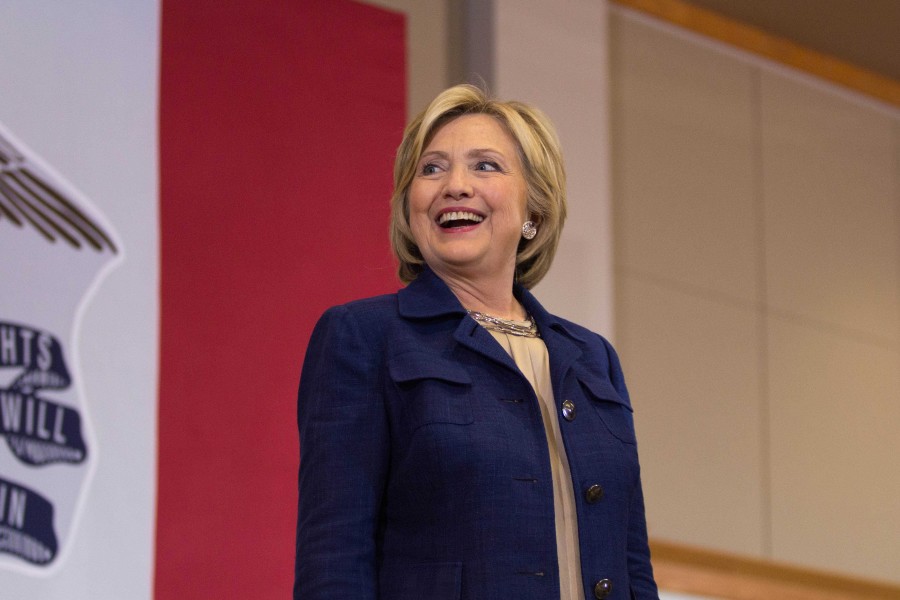Clinton ‘deals in’ gender card
Sep 17, 2015
“Republicans often say I’m ‘playing the gender card,’” said Hillary Clinton to a crowd of 500 at a Women for Hillary organized event at UNI on Monday. “Well, if supporting women’s health and women’s rights is ‘playing the gender card,’ then deal me in.”
Many of the talking points in Clinton’s 40-minute speech were aimed at addressing “women’s issues” — paid family leave, equal wages, violence against women, affordable childcare and reproductive rights.
Renae Beard, student body vice president and women’s and gender studies program graduate, was invited to the conversation prior to Clinton’s speech.
“The conversation was great,” Beard said. “ [Clinton] was very focused on supporting women and the mentors and violence prevention program, and what UNI is doing to be looked at as a leader for other college universities and communities.”
Clinton said UNI is “winning in many ways,” having mentioned the football team’s recent victory and alluding to the ways she felt UNI has worked to address issues of sexual assault on campus.
“The fraternities and sororities have done a lot to promote sexual assault awareness, and they are working very closely with me,” Beard said.
Beard said the Center for Violence Prevention has also released a new program that features classes for this specific initiative.
Rinken said she was drawn to Clinton’s support for raising the minimum wage and Clinton recognizing that sexual assault on campuses needs to be addressed through providing the proper resources.
Clinton said survivors are often forced to navigate a confusing and bureaucratically saturated path to report sexual assault, and that she would “fight to make sure these services are comprehensive, confidential and coordinated.”
When asked what she would do to consider the rights of the accused in sexual assault cases, Clinton maintained that a survivor “must be listened to,” and that a “fair process” is the answer.
Other students felt the event alienated them.
“Women’s issues are very important, don’t get me wrong, but as a man, it’s hard to put myself in the situation [or] in women’s shoes,” said Jordan Peterson, senior Spanish major at UNI. “Addressing women, she had a section during her speech for only women. So it’s really hard for me to feel involved in this campaign.”
Adjacent to the lifted stage was an additional raised set of seating, which was perceived by some as designated for women only.
Katherine Rinken, sophomore social sciences secondary education major, was one of the 20-some who sat in the raised seating for the speech.
“I think it was only for women, yeah,” Rinken said. “Somebody asked [presumably a campaign official] what it was for, and she said that it was for women and I didn’t hear the rest of the answer.”
“That’s not the case,” said Kate Waters, a press coordinator with the Clinton campaign.
Waters said the seats were saved for those UNI students and survivors of sexual assault who met with Clinton just prior to her speech, which Rinken did not do.
Clinton’s poll numbers have dropped 29 points with women since July, according to a Washington Post poll that surveyed 1,003 random adults via telephone Sept. 7-10.
Clinton said she is confident, despite the recent poll, and attributes the erosion to the “ebb and flow” of polling throughout the course of a campaign.
A YouGov/CBS News poll, also from this week, shows Clinton has lost her lead in Iowa to Democratic Presidential candidate Bernie Sanders, an independent from Vermont. She trails by him by 10 percentage points, according to data gained from online interviews of 646 registered voters in Iowa.
Asked on two separate occasions about her thoughts on Bernie Sanders, but not specifically the poll, Clinton said the nomination is supposed to be a contest and is “earned.” She said the Democratic debates will help voters draw contrasts between her platform and Sanders’.
Clinton drew also drew connections between economic issues and so-called “women’s issues.”
According to Clinton, two-thirds of minimum wage workers are women, and this makes raising the minimum wage a women’s issue. She also championed the eradication of the “tipped minimum wage,” which she cited as an economic tool that exploits “predominantly women.” She said women can be paid “as little as $2.13 an hour waitressing, bartending or [as a] hair salon employee.”
“The theory is that they will get up to the minimum wage with tips. But the reality is that’s often not the case … And they often have to get harassed to get them,” Clinton said, drawing applause.
Perhaps the most raucous applause came from Clinton’s direct denunciation of Governor Terry Branstad’s veto of mental health funding that effectively closed two of Iowa’s four mental health facilities. Clinton called the decision “absolute[ly] inexplicable.”
“I think we are on the way to a campaign of great significance,” Clinton said. “So please join me in helping build an America where … a father can say to his daughter: ‘You can be anything you want, even President of the United States.’”















